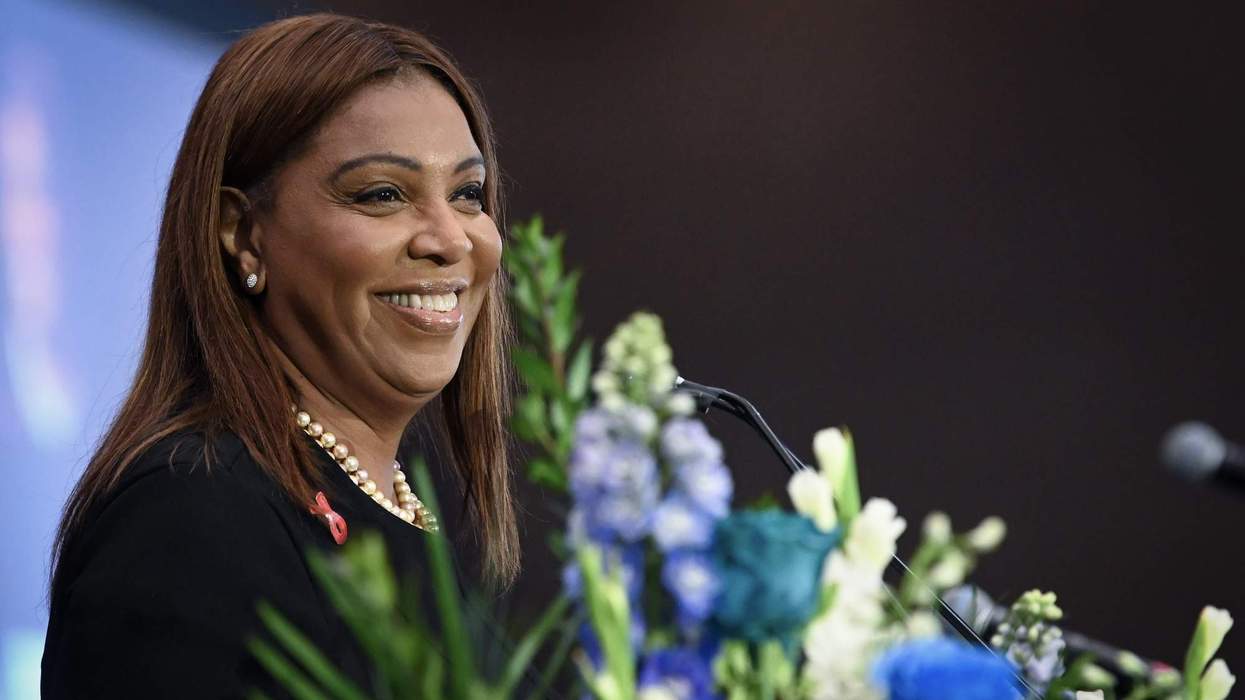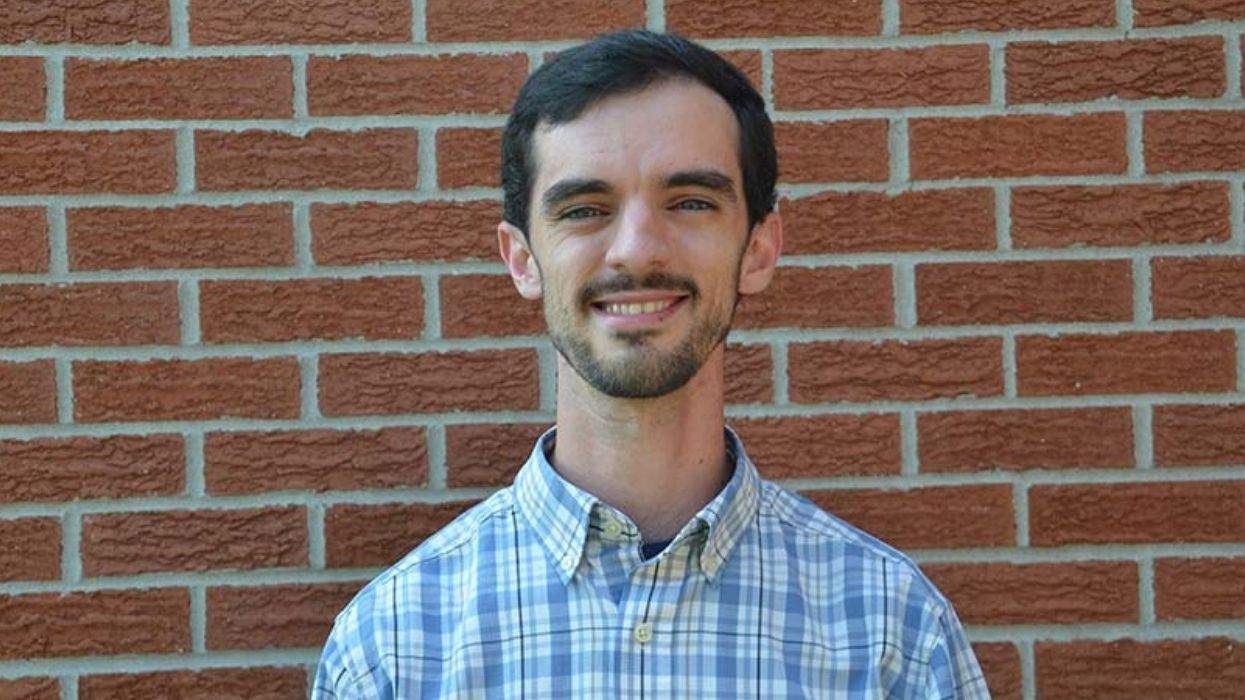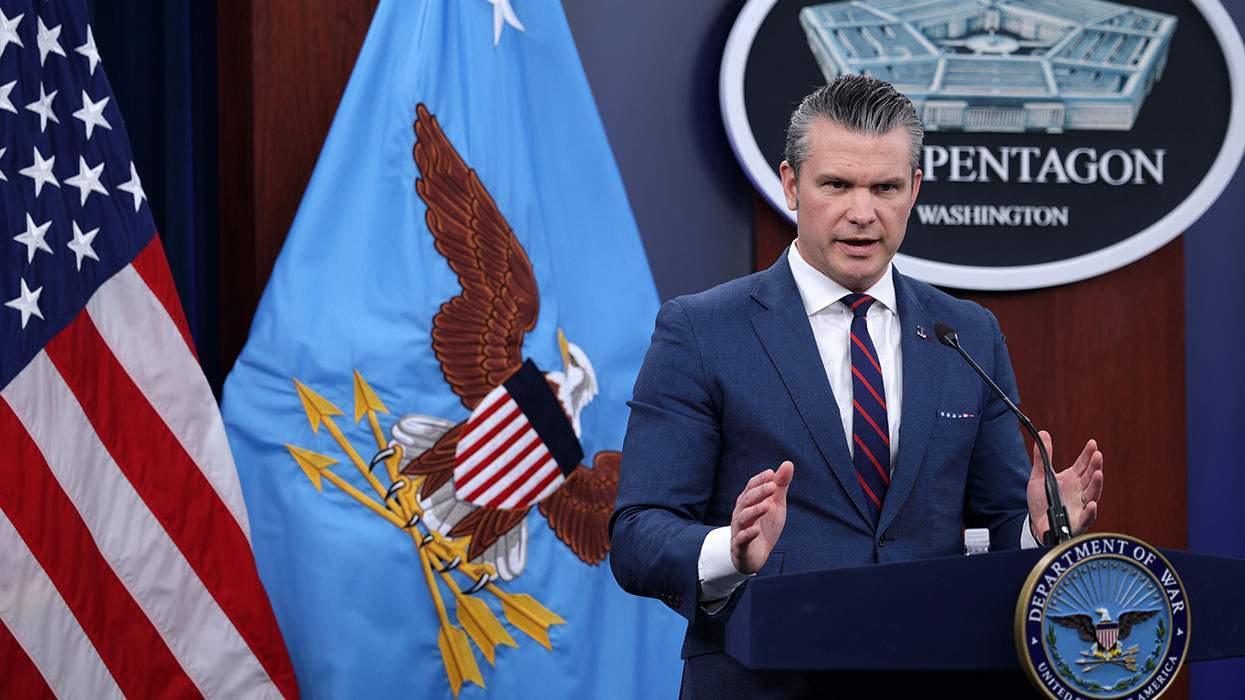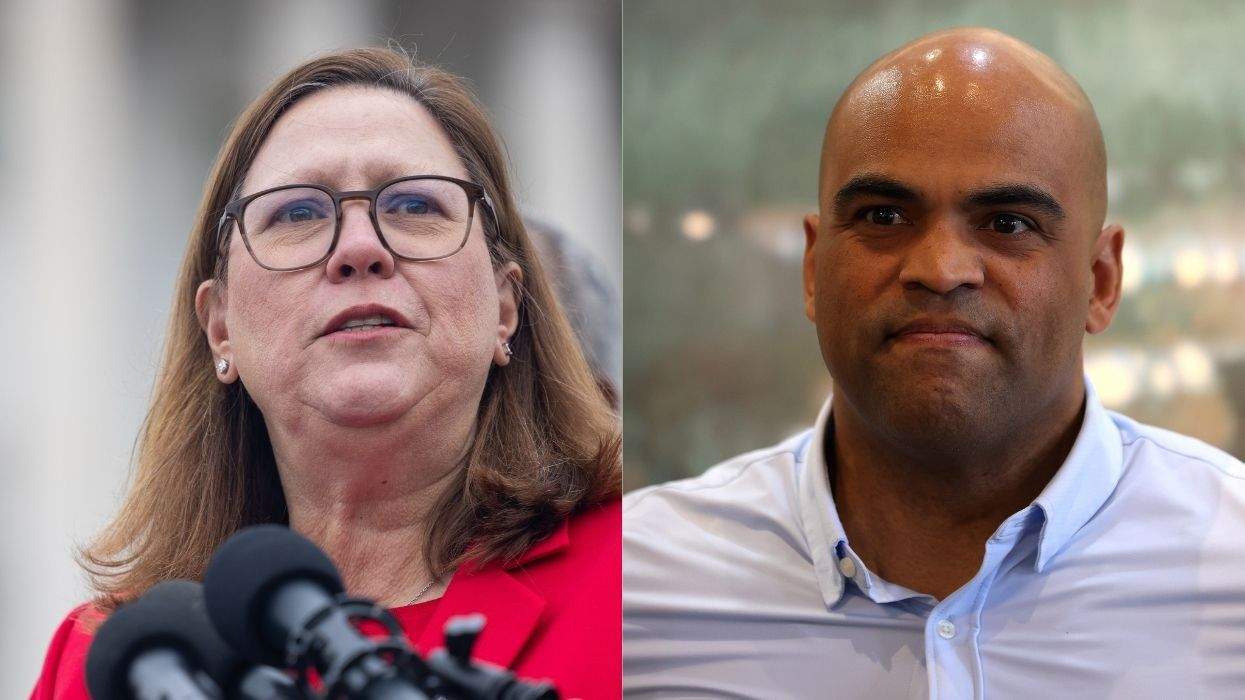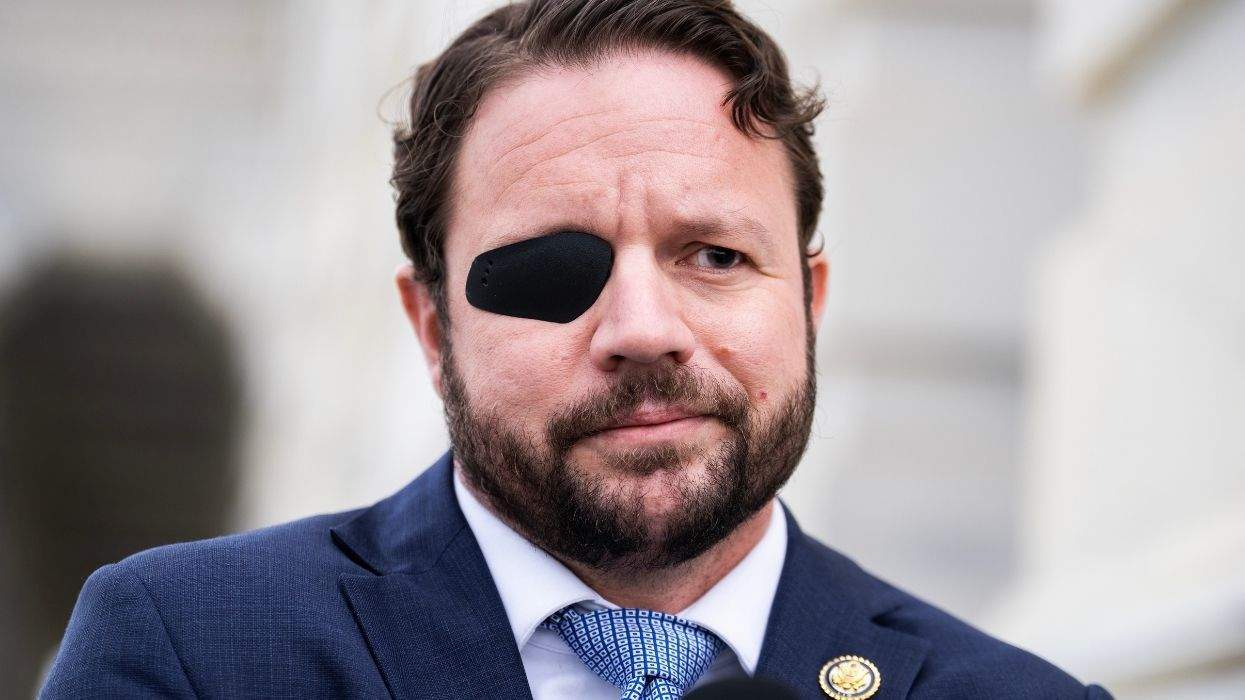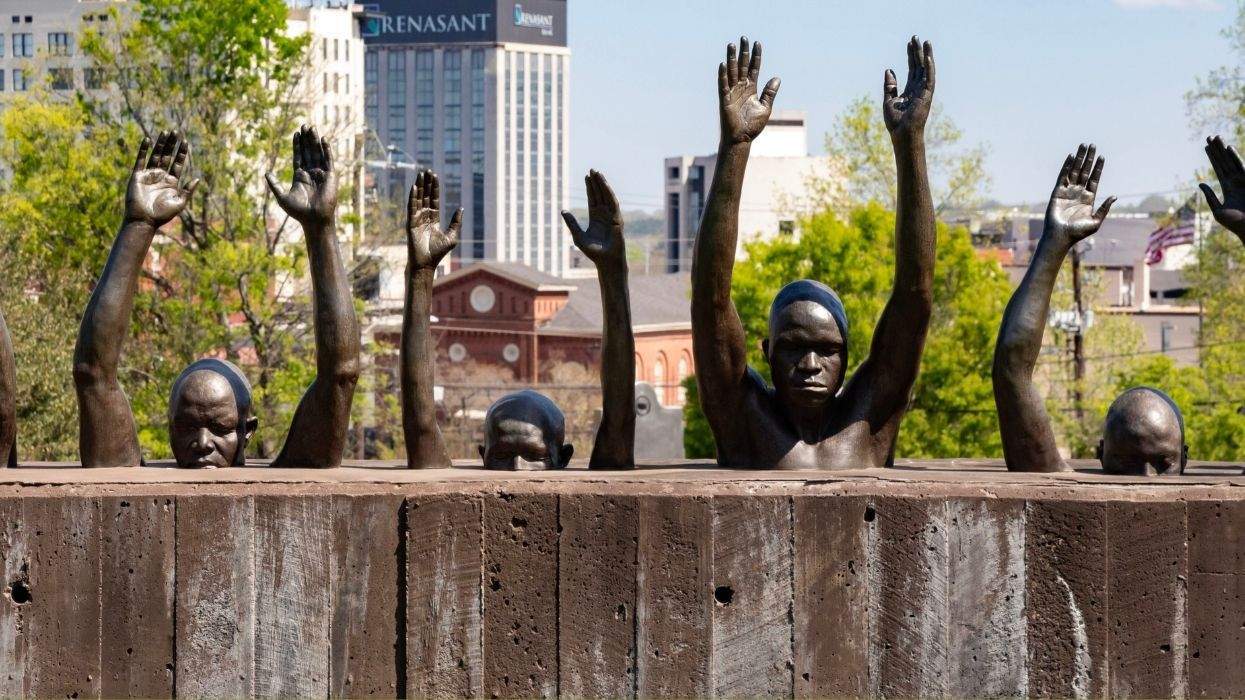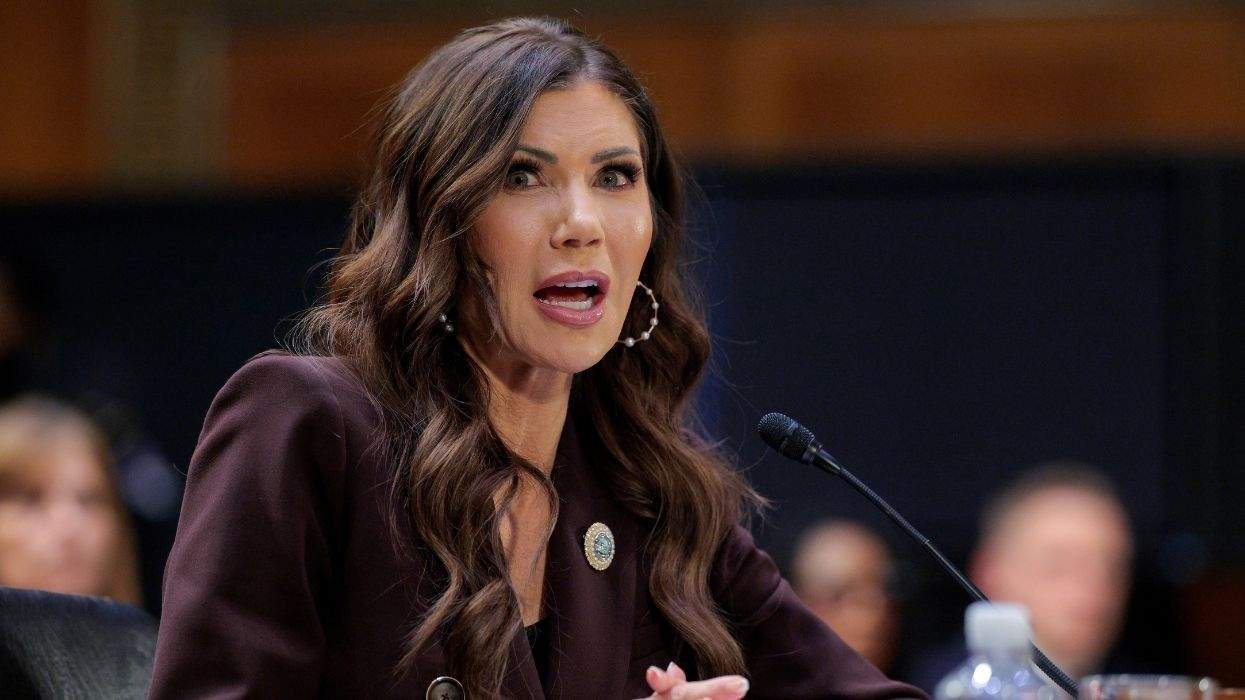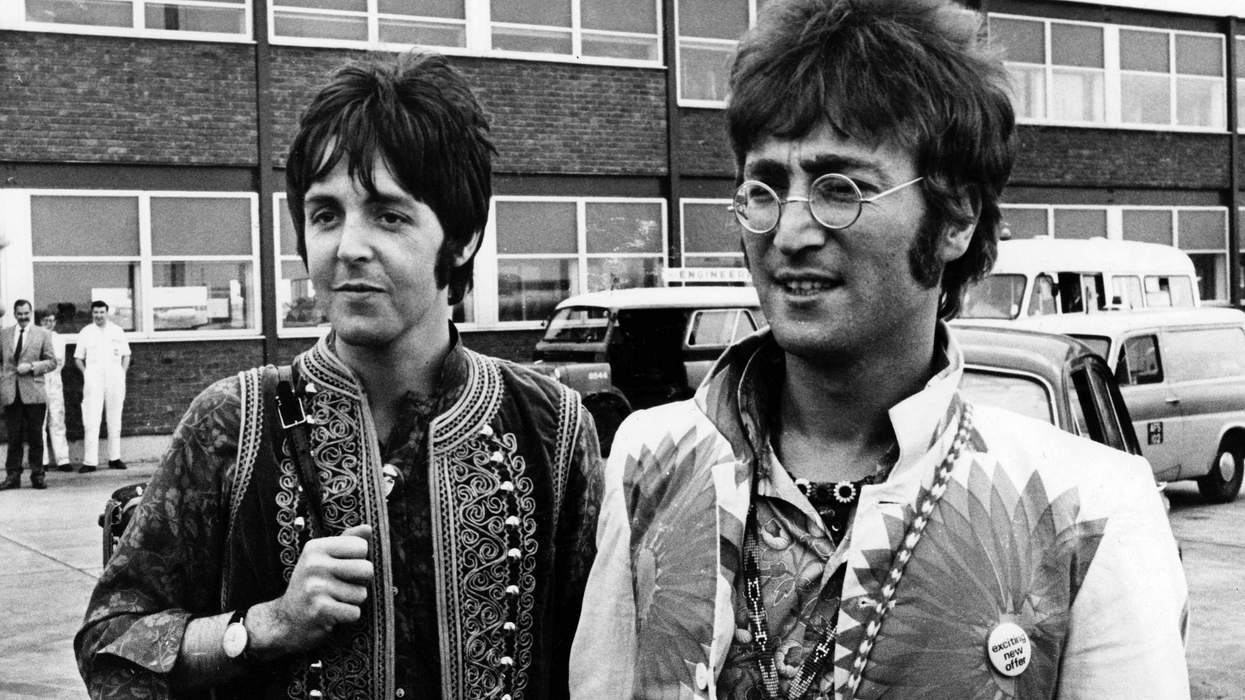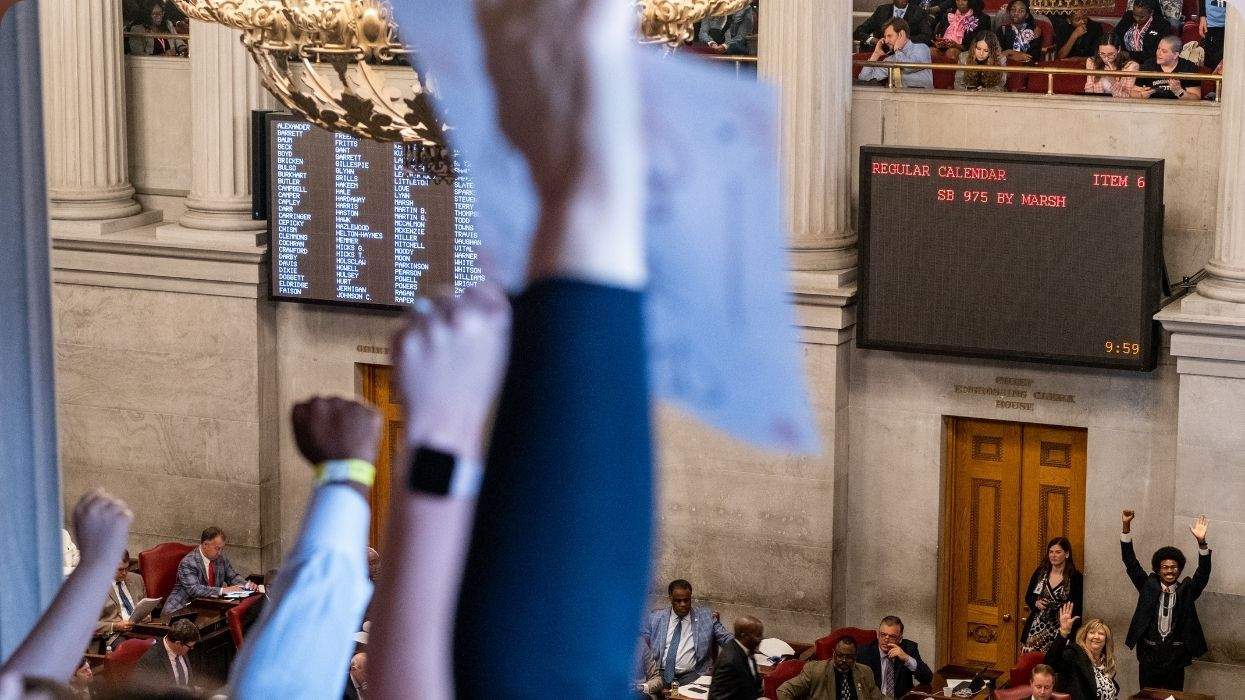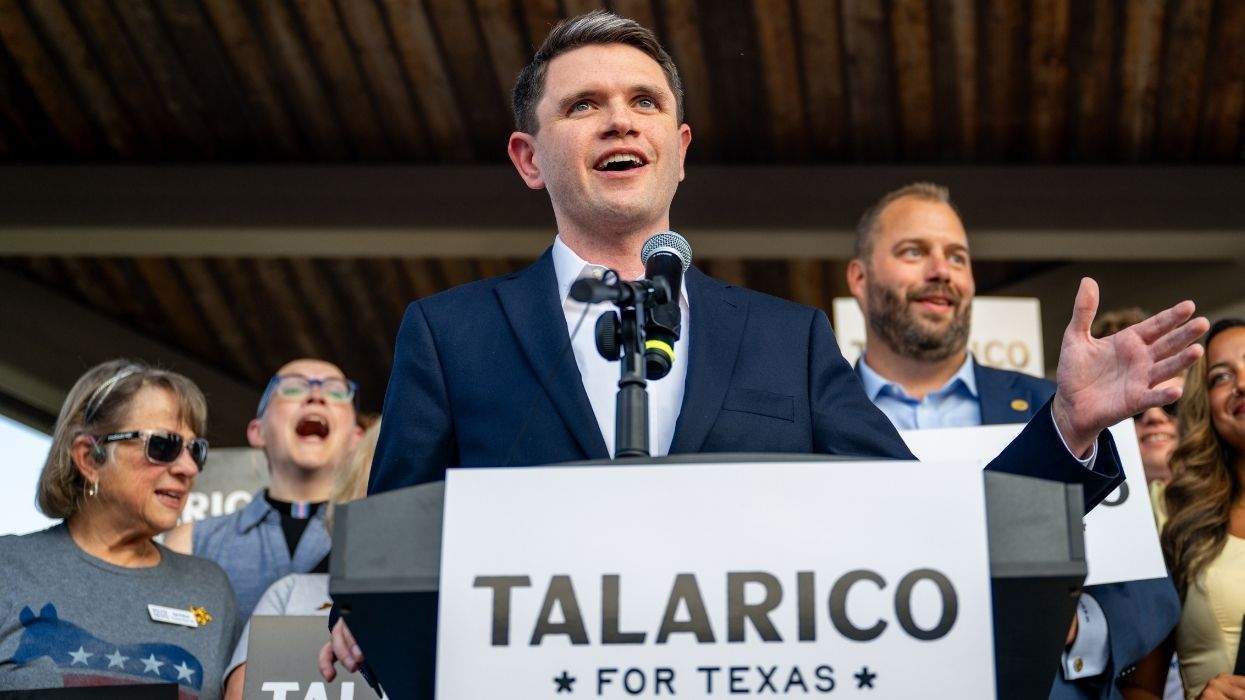In May 2004, I was in Bucharest, Romania, on the film set of Seed of Chucky, the directorial debut of Don Mancini, the out gay screenwriter of all five of the Child's Play movies, including Universal's 1998 blockbuster, Bride of Chucky and this latest installment.
In addition to writing about the production, I was there to interview actress Jennifer Tilly, the film's star, and one of the reigning icons of gay culture. The phenomenal success of 1998's Bride of Chucky--both a mainstream hit that made $83 million for Universal Pictures and a surprise sleeper hit with gay audiences--is largely attributed to Tilly's participation. The combined star power of Mancini's brilliant script--rife with camp, satire, and a razor-sharp gay sensibility--and the introduction of Tilly's character, Tiffany, the bride of the eponymous redheaded doll, revitalized the 10-year-old Child's Play franchise in an unparalleled fashion.
In Bride, Tilly's "human" character, Tiffany (played by the actress during five actual on-set days, totaling approximately 15 minutes in actual screen time) dies a spectacular death at the beginning of the film, when Chucky knocks the television set into Tiffany's bathtub as she watches Bride of Frankenstein. As Tiffany dies, Chucky sends her soul into a smiling, plastic bride doll. After her "resurrection," Tiffany performs a makeover on her "doll self," eradicating all traces of the bridal puppet's compliant, suburban facade with bleach and makeup, to the backbeat of Blondie's "Call Me." That memorably camp moment, as well as others in Bride, struck a surprisingly welcome note with gay audiences who have historically been very badly served by the horror genre, which relies on rigid gender roles, namely male aggressor, female victim, and no gender ambiguity.
"It had a very prominent gay sensibility," says Don Mancini of Bride. "Not just with Jennifer, though she's a very big part of that. She's been associated with gay roles, but she herself is iconic. The roles she plays tend to be almost exaggerated caricatures of femininity in a way that gay audiences have historically embraced and celebrated. Bride also had a gay principal character, and featured performances by Alexis Arquette and John Ritter. There were a lot of aspects that resonated with gay audiences."
Though the following interview had less to do with the Chucky movies than with other aspects of Tilly's life and career, it's worth noting that Seed of Chucky seemed poised to push that gay envelope further. Tilly not only reprises her role as the voice of the "Tiffany" doll, she also plays "herself": a spoof version of "Jennifer Tilly," a diva on the skids making a film about the murderous dolls of urban legend. She soon finds herself stalked, not only by Chucky and Tiffany, but also by their anatomically ambivalent, gender-confused "seed," Glenn.
Tilly, an Academy Award-nominated actress with a blue-chip resume as well as an established indie goddess, found the opportunity to send herself up to be completely intoxicating. In a career that dates back to 1983, and encompasses such memorable films and diverse films as The Fabulous Baker Boys (1989), The Doors (1991), and Monsters, Inc. (2001), Tilly is best known and loved by gay audiences from her over-the-top star turns in such films as Bound (1996), Bullets Over Broadway (1994), Bella Mafia (1997), and Relax...It's Just Sex (1998). In person, she radiates an effortless glamour that is nearly a throwback to another era. Utterly modern, though, is the way it is leavened with a healthy dose of self-deprecation and wicked deadpan humor.
That week, in Bucharest, there was an international martial arts competition. Many of the athletes were sequestered at the Marriott. Never at a loss for male attention under the best of circumstances, Tilly's presence in the hotel caused a phenomenal stir among the athletes. She graciously signed autographs and posed for photographs almost on autopilot, for fans who could barely speak enough English to ask her for them.
On Friday, May 16, I sat down with Jennifer Tilly in the hotel's dining room for this exclusive interview--liberally laced with explosions of her signature throaty laughter--on life as a gay icon, morality, the Hollywood closet, killer dolls, the importance of gaydar and good jewelry, the essential, gay men in her life, and what the icons we love actually love about us.
As we talked and Tilly sipped her wine, I couldn't help noticing that it perfectly matched her lipstick It might have been a trick of the light, but I doubt it. The effect was somehow perfectly Jennifer Tilly: too fabulous.
Michael Rowe: You mentioned yesterday that Don Mancini had started writing the first draft of Seed of Chucky right after Bride of Chucky and that Universal Pictures thought it was "too gay," and "too much Jennifer Tilly." Two extraordinary observations, in my opinion, for the producers of a horror film. Would you elaborate? Jennifer Tilly: My first thought was, Wait a minute--how can there be too much Jennifer Tilly? [Laughs uproariously] Seriously, I was thinking, Don's given me such a gift. Usually sequels are not successful. Basically, you retread the original, like a Xerox copy that gets fuzzier and fuzzier. But I think Seed of Chucky is a genius script. I loved the movie. If I were to cite eight to 10 films of mine, Bride is one of my favorites, and is the one people recognize me from more than any other. I think Don's turned the horror genre on its ear with these films, and added all these other different elements. Don's such a quiet, serious guy. I didn't think he had all this humor in him when I first met him years ago.
In this film, you not only reprise the "character" of the voice of the Tiffany doll you created in Bride, you also play yourself, Jennifer Tilly, an actress being stalked by two killer dolls. It's an inherently campy premise, especially since part of the "Jennifer Tilly" role is a parody of how a movie star is perceived. I've been asked to play myself before, and it's always me but not me too--you know what I mean? At first, when Don told me I was going to play myself in this movie, I said, "Please, make me a psycho bitch from hell!" So we started that way. Initially, "Jennifer Tilly" was going to be a lot meaner. In one scene, I'm on a diet, and I'm not going to let my assistant eat because I have no willpower myself. There's another instance where I said, "I don't want to be playing these sexpot roles when I'm 40," and my assistant says, "Jennifer, you are 40!" I'm playing a movie star, and I'm making her a bit more peevish than I actually am. In the movie I wear leopard coats and sunglasses, and cleavage. I'm sleeping with a director to get a part--which isn't something I ever do unless I want to sleep with him anyway. [Laughs] "Jennifer Tilly" is never relaxed. She's always a sex symbol. When she goes down the street to check the mail, she's not without her stilettos, push-up bra, and false eyelashes. In the movie, even in the hospital scene where I'm giving birth--a great place for a no-makeup look--I'm wearing false eyelashes. "Jennifer Tilly" looks good even when she's sweating and screaming.
Well, the studio is at least partly right. That's exceptionally gay. People [at the studio] kept telling Don, "Can't her character be really nice, and all her friends are being killed off?" And Don said, "Oh, yeah, like Neve Campbell in Scream? [Laughs] I think I'm a little too old to be the nubile ingenue.
No one is going to believe that you can't take care of yourself by now--that's for sure.Exactly. I felt like people didn't understand what Don was trying to do. After Bride came out, there were always reasons why they couldn't make the next one--the Columbine murders put a real chill on horror movies in Hollywood. That was the excuse most often used. So Don kept rewriting it. He came up with all sorts of other ideas--for instance, a riff on Psycho, where we were all living in the Psycho house. Don kept trying. For me, everywhere I went, people would always ask me, "When is the next Chucky movie coming out? We want to see more Chucky!" Don kept going though all sorts of ideas. Then it was put on the fast track when Freddy vs. Jason opened with nearly $40 million. And then they wanted to shoot the original script.
Do you think that one of the reasons that Tiffany has become so popular is that she was really tailor-made for you to play her, largely because Don knows you as well as he does? Tiffany is largely a send-up of another sort: the white-trash bleach-blond serial killer with a heart of gold--once again, another over-the-top character. Don calls you his muse. Are you his muse? Don gets it, and he gets me. The studio was trying to get him to hire a couple of pretty girls from Baywatch for Bride of Chucky. They couldn't understand why Don wanted me, and I didn't even want to do the movie. Don and [producer] David Kirschner kicked in money from their own pockets to make my salary. David really supports Don, and Don thought it was really important. I'll always consider something if I hear that the director really wants me. I always say, "If they really want me, they must have great taste!" [Laughs] "He must have a superlative vision." I try to make Don feel like he was really lucky to get me, but this role was a gift to me. He gave me this wonderful, wonderful gift. Initially, I didn't sign a deal for a sequel. I was only going to do the first movie for about 15 minutes of on-screen time, then as the voice of the Tiffany doll for the rest of it. But I love that he thought he had to have me in the flesh for Seed.
Don is an out gay screenwriter, and you yourself are an icon in gay male popular culture in your own right. The Chucky movies have a weird sort of counterculture chic in the gay community and, oddly, a huge gay following. To what do you attribute that--both the film's and your own? Chucky has a huge gay following. A few years ago, I received an award at the Philadelphia Gay and Lesbian Film Festival. They screened Bound, Relax, It's Just Sex, Bullets Over Broadway, and Bride of Chucky. There was a huge audience attendance, and they laughed in all the right places. Bride works on a lot of levels, but there are a lot of camp references--really, really funny ones--and it was great to watch it with a gay audience because they got all of them. A straight audience laughs when Chucky smokes pot; the gay audience laughs at the ironies and the camp elements. I had my gay following even before I did Bound and Relax, It's Just Sex. I've tried to figure it out in the past, and what I've come up with is that I'm over-the-top. In some sense, it's like I'm a female drag queen. I'm really lucky that I've never been offered the sort of roles that are offered to Julia Roberts or Reese Witherspoon. [Laughs] It's this really weird groove that you get in. For some reason, there isn't much cross-pollination between the major motion picture, and the indie films. But I'm very, very lucky in terms of the independent films, and I can tell the difference between a good script and a bad script. Also, it's good that I don't really need the money--I love money, though.
Do you have some sort of addiction you'd like to confess here, Jennifer? Some sort of illicit dependency or habit? I've done a few really terrible movies because I have a jewelry addiction. I actually did one movie just because of some jewelry I wanted. I've lived pretty hand-to-mouth, but in a very extravagant way. My jeweler called me up and said, "Jennifer! Jennifer! We've just gotten in a whole lot of David Webb jewelry!" I said, "I'll be right over!" I started making piles. I had this little mountain of David Webb jewelry. I realized I didn't have any money, but I had a check coming in the following week. I said, "Can you wait until then?" And he said, "Sure, Jennifer, we know you're good for it." On the way home, I started crying. I called my manager on the car phone and asked him if there were any movies coming up. He told me that there was a movie that we'd passed on four times, but although the fee was much less than my usual fee, it was the exact amount of my jewelry bill. It was divine intervention. It's a movie I don't think will ever come out, but I run around in lingerie and kill people. I'm a Colombian drug runner with cleavage who kills people with her thighs.
The things we do for jewelry. I think your gay fan-base would not only understand the sacrifice but embrace the film, oddly enough. We'll see when and if it comes out. When did you first notice that you had accumulated those very devoted fans? When I did Bullets Over Broadway, I started to notice gay guys were always coming up to me. It must have been the feathers and the excesses of Olive's character--really loud and out there. Also, maybe what appealed to gay men about Olive was the whole notion of "dreaming the impossible dream." Drag queens, especially, can identify--all the dressing up and the fake breasts in the world aren't going to make them women. Olive knows she isn't going to make it as an actress on Broadway, but she almost does. She has a fierce determination: "This is what I want to be! I want to be an actress!" With Bound [where Tilly's gangster moll character famously engaged in a lesbian encounter with a lesbian played by actress Gina Gershon], it wasn't just gay women who made up its following. A lot of gay men said, "That movie turned me on, and I'm gay!" Again, I may be overanalyzing, but I think it might just be that my personality is larger than life, and that the character was very sexual. Another film that had a big gay following was Bella Mafia. I think that's why people loved Bride of Chucky. My character, Tiffany, had a lot of those elements.
You could imagine Tiffany working at some trashy mall, and having a lot of gay friends-- And her boyfriend was Alexis Arquette! [Laughs] Also, Bride of Chucky had a principal gay character, the girlfriend's best friend, who was trying to help them. The fact that he was gay wasn't a huge plot point, it was just touched on. But he was really sympathetic. And then he died a spectacular death. When Don writes a spectacular death, he sees it as a gift to the actor.
People fans seem to know you here in Bucharest, which, I confess, while impressive, surprises me. We were just upstairs, and you had three incredibly hot Romanian martial artists ask you for an autograph and a photo. How many of them can possibly have had access to the films in your oeuvre, let alone the Chucky films? It's so bizarre to me. When you do a movie like Seed of Chucky, it's you and 30 crew members in a field at 3 in the morning. Then it goes around the world. It's astonishing. I find myself in countries I haven't even heard of--that makes me sound ignorant, but I don't care--and people come up to me and say, "Oh, my God!" It's pretty astonishing.
I think I'm really big in Japan. Bride of Chucky is huge, huge, huge in Mexico. You do your movie, you collect your paycheck, and then you go home. The movies go around the world, and then you find out that your movies play constantly. I went to Bulgaria, and every movie seemed to be starring Mimi Rogers! [Laughs] The other day on television, I saw a really obscure movie I did with William Hurt and Denis Leary called Do Not Disturb [1999]. I don't think it's ever even been on U.S. television.
And yet, here, I've noticed people turning around when they hear your voice, which is distinctive enough to warrant having been called attention to in the media: the Jennifer Tilly Voice. I tend to be recognized by my voice in countries where they use subtitles. When I was in France, I wasn't recognized. My friend Oliver and I were at a restaurant, and we wanted to get a table. I said, "Leave it to me." When I want to play "the Jennifer Tilly card," I don't ever say "Do you know who I am?" because it's cheesy. But I talk in my "Jennifer Tilly voice" because I can put it on. I went up to the desk and said, "Are those tables reserved?" And the maitre d' snapped "Yes!" [Laughs] I went back and said, "The Jennifer Tilly thing didn't work."
Because in France they dubbed your voice?Yes! So, in France and Germany I have a totally different voice. But in countries where I have my own voice, I'm recognized. Also, when I'm all done up to the gills, I look more like what I look like on the screen, so I'm recognized there too.
Do you find it hard to meet straight men, in a romantic context, who can get past your persona? Do they have to work harder to find out who you are? I think a lot of men don't approach me because they think I'm a movie star, or glamorous, or have a lot of boyfriends.
Well, they're right. You are glamorous, and you are a movie star. Do you have a lot of boyfriends? The truth is, I'm pretty monogamous. In the past, I've had the same boyfriend for eight or nine years. I was married for seven years. There are little pockets of time when I'm single, and I don't like being single too much. I read an article once that said, "You'll never meet a man if you hang out in bar with a pack of your gay friends"--which, of course, I do. I go everywhere with them. Last year my friend Kirk and I were in France. Then Paul and I and seven of Paul's friends stayed in a villa in Tuscany--the best vacation ever. But we didn't bother to see any of the sights. All we did was shop and eat in all these fabulous places and go to gay clubs. Every day it was "Fuck the David. Let's go back to the Prada outlet!" [Laughs] I loved it.
Have the straight men in your life--your love interests--been able to deal with the presence of all your gay friends? Women who have an advance guard of fashionable gay men can be a little intimidating to straight men sometimes. I have to confess that they're often disconcerted by it. I really like to go places and dance and laugh and drink. My ex-boyfriend liked to stay home. I've never really wanted that life, where you sit at home and watch television or bowl on Saturdays--whatever normal people do.
When I was young, I wanted to be a gay man. They all look like they shop at Barneys--wait, they all do!--and they always say things like, "I'm just back from the South of France," and they always are. With Paul, I've been to Ibiza, Paris, Milan, Tuscany, and we're going to Mykonos this summer. Most of my friends my age have husbands and babies and stuff. Gay men can always pack up at a moment's notice. I've known a lot of the people I hang out with for 10 or 15 years. All of that having been said, when you're at a club, sitting at a table with seven gay men, no straight man is going to come up to you. [Laughs]
I've often wondered about straight men in a situation like that, guys who are not remotely homophobic and yet not particularly homophilic either. Gay men are not necessarily their first choice when it comes to people to hang out with, yet they're unavoidable in a case like this. When they have a girlfriend who has a phalanx of gay men surrounding her, what must they confront in themselves? I've had guys say, "Oh, your gay friends laugh at everything you say because they're sycophantic." I always say, "No, it's that I'm funny." [Laughs] I say, "If you don't find me funny, it doesn't mean I'm not funny; it means you don't get it." It comes from having the same sense of humor. It's like when I had my Mommie Dearest viewing party; my boyfriend fled the house. [Laughs] He said, "Call me when it's over." My ex-ex-ex-boyfriend was into soccer. I didn't mind sitting and watching with him, but it wasn't "Hooray! It's Chelsea versus Arsenal!" All righty, then.
When you were growing up, were you one of those teenage girls that all the gay boys gravitated toward? I lived in a very small Canadian town [in rural British Columbia]. I never knew any gay kids. As far as I knew, where I grew up, there weren't any Jewish people or black people. When I graduated and went to theater school, I heard whispers that some of the guys were gay. When I look back on it, I say, "Of course they were!" But at the time is was like, "Ooh, they have sex with other men!" [Laughs uproariously] I first encountered a lot of gay people when I was doing a show in Key West years ago. I was shopping in the gay men's stores because they were the only places that had cool stuff. Also, the only clubs that had good music were the gay clubs. And that's when I first started moving in that community.
Did your perceptions of "who is" and "who isn't" evolve commensurately? I've finally developed amazing gaydar. I can always tell if someone is gay or not, even if they're married and have four kids. I can tell. But when I first moved to Los Angeles, I dated a gay man and didn't even know it. It must have been too close to home!
So you not only have a huge gay following, you attract closet cases too? I'm really attracted to gay men. I have a huge propensity for that. I'm nervous with the straight male sensibility--when I go to a bar and someone sends me a drink, I usually don't take it. I've never been into the supermacho guy who watched the Lakers, and high-fives, and drinks tequila out of a stripper's belly button. Straight guys don't really have any mystery to them. That's just my take on it. During my little romance with the gay guy, I was just so confused! I was, like, "You don't want to have sex with me? You're not attracted to me?" [Laughs] Even my sister was like, "Jennifer, you're really attractive!" And I was like, "Maybe he does too many drugs, or he's a workaholic!" And the thing that kept bobbing to the surface was, "Well, he's gay!" And I was, like, "No, no, no, no! I wouldn't be dating a gay man. I'm Jennifer Tilly!" [Laughs]
When you found out that he was gay, did that allay some of your bruised ego over the end of the relationship? Was that a comfort to you? It explained a lot. I'd already broken up with him, then I found out for a fact. But a woman has intuition--I guess everyone does. You have thoughts. Do you remember Angels in America [Tony Kushner's Pulitzer Prize-winning play about AIDS, God, and the pernicious nature of the closet]? Joe Pitt is being hit on in the bathroom of his office by Louis, and Joe's, like, "Why are you hitting on me?" And Louis says, "Because you're gay!" And Joe says, "No I'm not!" And meanwhile, Joe's wife is rolling around in pain and having nightmares and saying, "I think my husband is gay!" That's sort of what I went through. Intuition is a funny thing. I had a boyfriend once--
Not another gay one, I hope. No, this one was straight. And I had this feeling that he was cheating on me. So I went over to his house late one night, and caught him in bed with another girl. And I was exuberant! [Laughs] "I'm not crazy! I'm not psycho!" My subconscious was trying to tell me something that I was always pushing down. And with the gay guy, I had been thinking that I was the one who was overly imaginative, and now it was, like, of course. So, ultimately, there was nothing I could do to make the relationship work.
Even though one would like to believe that these "double lives" are something out of the past, they do seem to pop up with alarming regularity, even today. I was at a party with a gay friend of mine and he said, "So-and-so just got engaged today. Last night I was sleeping with him, and he said to me, 'Tomorrow I'm going to propose to my girlfriend, and I just want one last night.' " I think that's a really insidious thing: gay men who think they can be "cured," or who try to pass for straight. They do a lot of damage in the process.
Do you think that applies equally in Hollywood as in "real life"--for instance, mainstream American society? I understand it in the film industry--trying to pass for straight--because it does really affect your career. I don't know, if I was a gay male actor [whether] I'd be in the closet or not. It's a horrible, horrible price to pay [for a successful acting career]. I think the most important thing is to live your life authentically. But there are some people in the business who are very cool about it. I don't want to name any names, but there are some guys who say, "Look, I'm not lying or trying to pretend I have a girlfriend or anything, but my private life is my private life." Even when you think in terms of Ben Affleck and Jennifer Lopez: Why should their private lives affect their film careers? But it does.
Do you see a difference between people who actively court passing as straight in Hollywood and people who simply omit discussing their sexual orientation at all? Yes, I do. I think it's kind of desperate and offensive to the gay community when certain movie stars--some of whom have won Oscars and are in a position to make a lot of changes in the way people perceive the gay population--instead of looking around and asking, "How can I help the gay community which has supported me," imply [by their actions] that being gay is something to be ashamed of, like it's some horrible secret. I really admire people like Rupert Everett.
Rupert Everett, though, is a rather unique case. I think a great deal of that has to do with the fact that he's English, and not only are the English generally less paranoid and furious on the topic of gay actors, Americans think of them as "exotic,"so they're already one step removed from the average American "Hollywood" actor. A good friend of mine, an actor, came out. Prior to coming out, he was, like, a young hunk--always worked in television. In the beginning, he was very happy when he came out. He started playing all of these gay roles, and had a wonderful presence and warmth and humor. He did a great job playing these sympathetic gay characters. He's very political, and he spends a lot of time going to schools and talking about homophobia, and how it's OK to be what you are. But his career took a sharp turn [once he came out]. Now he's a gay advocate and a poster boy, but his career in Hollywood vanished. Now he lives in Middle America, and he's doing community theater.
That's a significant price to pay. Do you think he regrets it at all? He's a really good-looking guy who could pass as straight. I don't think he would look back and say he regretted coming out. But still, I have to wonder. Gay acceptance has grown in leaps and bounds, even in the last 10 years. But you forget that the people who first came out, like Rupert Everett, were actually pioneers. As you said, in England people don't care so much about your personal sexual life. It's definitely an American thing.
What sort of a response have you noticed from the mainstream American viewing audience with a film like, say, Relax...It's Just Sex, which shows gay people interacting with straight people on an equal footing while at the same time not skimping on either sex or romance? When we did Relax...It's Just Sex, the film premiered at Sundance. Me and Lori Petty were standing near the exit. People were coming out, crying, because it's a very emotionally affecting film. This little old lady and a little old man walked past us, wiping away their tears. And they stopped and shook our hands. The old lady said, "Thank you, dear. Thank you for showing us how you people really are."
"You people?" Lord, that must have been your gayest moment ever. [Laughs] "You people!" Like we were some bizarre aboriginal tribe in Zimbabwe! We were, like, "Er...well...um." Also, with Relax, my ski instructor who was a very strict Mormon, and macho as they come, said to me, "I never knew that gay people had the same problems we do. They're kind of like us, worrying about dating and being loved." He didn't know. He had no idea! And I suddenly realized that I've lived in New York, San Francisco, Los Angeles and worked in the fashion industry and the film industry. You forget that there are 50 states out there. When you live in a cosmopolitan city, you think that's the attitude across America. When you go to smaller places, you realize what you're up against.
There are a growing number of high-profile lesbian celebrities whom mainstream America have taken to heart. Rosie O'Donnell and Ellen DeGeneres come to mind especially, given that, in Rosie's case, she came into the living rooms of millions of housewives every day for several years, as Ellen is doing now. And Melissa Etheridge--well, she defies categorization. She's just a superstar, and not just among gay people. I was just thinking about Melissa Etheridge and Ellen DeGeneres, and what pioneers they are. Willingly or unwillingly, they made a huge step forward for lesbians--unlike certain other women who are still in the closet--in terms of acceptance. Essentially they said, "You like me; you like my music--hey, here's my girlfriend." Ironically it was the straight girls who were pulling them unwillingly into the spotlight.
It's worth noting at this point that there's room in the straight male imagination for lesbians as sexual objects, but that gay males are still seen as traitors. The same people who would say, "Oh, lesbians are cool!" or "Oh, lesbians are so hot!" would not necessarily extend the same grace to gay men who are open. The response has traditionally been both negative and violent. So I'm not sure the best way to gauge society's acceptance of gay people in the limelight is by their acceptance of lesbian celebrities. Absolutely. I think it starts with that macho homophobia. Men are not threatened by lesbians. They look at two lesbians and think, "Ooh, those two hot girls really need some dick." They imagine themselves walking into the middle and saying, "Hey, girls, you look like you could really use some servicing." [Laughs] But straight men are terrified of being penetrated. Even in the gay world, there seems to be a slight stigma about being a bottom. My gay friends are all, like, [adopts a swaggering, masculine tone] "Well, I'm the top." As though that makes them more macho. [Laughs] I was surprised the first time I heard that. There are certain communities also, like the Latin communities, where there's a lot of denial, where it's less OK to be gay.
I've noticed, over the last couple of years, that there are a lot more obviously gay people on television who still don't actually refer to themselves as gay in any context. Have you encountered anything like trepidation in Hollywood, with openly gay people being reluctant to attach the "gay" qualifier to themselves? I went in to talk to Bravo about a documentary show called Queer in America or something. It was a roundup show intended to discuss being gay in America. I looked at the lineup, and it was me, Cyndi Lauper, and Sophie B. Hawkins because she says she goes both ways. I think the only actual gay person they had was Rufus Wainwright. The producer was telling me that he'd called several people about being on the show, but either his calls weren't returned, or he was told "they aren't doing this sort of show." And I'm talking about people who are so out they're almost in. You'd think it was a good opportunity [for these celebrities] but they don't want their identities to be "the gay person,"even if [their day job is being] on a show telling straight people how to dress or whatever. The producer said he thought the word queer in the title of the show frightened people off.
What do you think of the current crop of media representations of gay people? We're undeniably more visible, but it's sometimes hard to tell if we're more "real" or just in focus. Although gay images are more prevalent in the media, it's still a little "step-and-fetch." You've got the stereotypes--the flaming guy who loves your Manolo Blahniks more than you do and helps you decorate. That aspect of the stereotype is really prevalent on television right now. And don't get me wrong. I have lots and lots of friends like that.
And it's not an unflattering stereotype necessarily. No, exactly. And the other stereotype is the really good-looking rough guy.
What about lesbian stereotypes? In Bound, you played Violet, the lesbian lover of a female ex-con, Corky, played by Gina Gershon. The two of you performed arguably the most famous lesbian sex scene in recent film memory. Did you have any trepidations? When we went in for Bound, the Wachowskis [brothers Andy and Larry, who codirected the film] were so pissed off. They showed me a list of actresses who had refused to come in to read for it. I thought it was one of the best scripts I'd ever read. I said, "This is amazing. If they shoot it the way they wrote it, it's going to be an amazing film." But people were really worried about the lesbianism.
Were you worried about it? And if so, what worried you? Yes, I was. And Gina was too. Back then, you have to understand, when a film had lesbian overtones, it was usually like Red Shoe Diaries or Penthouse. It was soft-core. They were usually B-movies with a lesbian shower scene. And this was a very sexual film in terms of concept. Both of us were worried that we were going to be in a really cheesy B-movie that would be playing on Showtime at midnight, and neither of us wanted that. I think that was a problem for a lot of actresses. Now--and it's tiresome [laughs]--every indie movie has the obligatory lesbian scene. It's the indie equivalent of the big-budget spectacular car-crash scene. Now, every time it's sweeps week with the networks, there's a little tidbit: "So-and-so kisses another girl!" On every single show! [Laughs] I think it sort of trivializes lesbians. Most of the lesbians I know are fairly earthy. They're not frilly little lingerie-wearing hotties. If I do a nude scene, I want to wear at least something, if only to cover up the cellulite! [Laughs]
How did you and Gina counteract that potentially "baby-blue porno movie" lesbian image in your scenes in Bound? Gina and I agreed that we didn't want to be wearing high heels or pearls or garter belts or any of the other Penthouse accoutrements of being a lesbian. We wanted it to be a flesh-on-flesh scene. Also, we're both so sexy, we can't help that. [Laughs] Lesbians that are represented in the popular media right now are "lipstick lesbians" or straight girls who dabble. In the clubs today you see girls French-kissing other girls to get the attention of the guys. It's the new hot thing for women to be bisexual.
Which caters to the whole objectification dynamic that makes lesbians acceptable to the heterosexual male population, as long as they're hot lesbians. It's like metrosexuals. I may just be bitter because of my gay ex-boyfriend [laughs] but I don't think there are metrosexuals, I just think they're gay men who haven't come out of the closet! [Laughs]. This is just my opinion, of course, but I think that the majority of men who label themselves as bisexual or bi-curious just don't want to say that they're gay. I think it's a huge step for a man to have--or admit that he wants to have--sex with a man.
It's interesting that this evolution of metrosexual men and the popularity of all these gay shows on television, from Queer as Folk to Queer Eye for the Straight Guy to all these decorating and fashion shows with these undeclared gay men issuing fashion and decorating edicts to bewildered straight people, should coincide so dramatically with a political shift to the right in the United States. There's the war in Iraq exploding gruesomely around us even as we speak today; there is a massive push to shut down gay marriage-- It's obscene. I was so disappointed in Arnold Schwarzenegger [in February 2004, after San Francisco started issuing licenses to same-sex couples] when he said, "These gay marriages have to stop!" I thought that made him look like such a puppet of the Republican party. He's in show business. He knows it's not a freak show; it's a political statement. I honestly felt as though the Republican party had gotten him into office and he had to tow the line. I felt like that couldn't possibly reflect his own private stance. But maybe I'm giving him too much credit.
What did you think of the response by the public to Rosie O'Donnell getting married in San Francisco? She has been both an inspiration for a lot of gay people and a huge lightning rod for bigotry in other cases. Some people said it made Rosie O'Donnell look belligerent when she said, "I'm going to marry my girlfriend!" But I understand the militantness that goes with a gesture like that. Of course she was defiant. It's terrible how they're trying to take rights away. As for Gavin Newsom, the mayor of San Francisco, good for him.
One of the arguments I heard a lot--which, I confess, always strikes me as absurd--is the notion that the reason gay people shouldn't be allowed to marry is that our relationships don't last. You hear people saying, "Oh, these marriages will never last!" and all the gloating that goes on when a high-profile gay couple breaks up, but heterosexual couples break up all the time--a month, a year, two years? You can't go into life saying, "These people shouldn't be allowed to marry if they're not going to be together for the next 20 years."
Or that gay people don't "need" to be married, as though "need" was ever a criteria for straight people who choose to marry. I have a friend who was with his partner for 17 years. When his lover died, he had to sell the house they lived in with his lover because of the laws. He's not recognized as the spouse in law. He has to pay almost 50% in taxes on almost everything they own. Also, the family is contesting the will. They're all alienated from their son, but now they're saying, "Hey, we're the closest family. He's nobody. He's the rent boy."
The rent boy of 17 years. Good Lord. Still, with the exception of individual provisions by some gay-positive companies, that's an accurate description of the general legal status of your friend. A company like, for instance, Disney, is very progressive in the sense that they allow employees to claim their same-sex spouses on their insurance, but at the same time this is why the law needs to change. This is why it's so important. If your lover is injured, you can be barred from the hospital by the family. A lot of times, people think they're going to live forever. If you don't have a will and you get hit by a car, your spouse has no legal resource at all.
Do you think that, as we've discussed, we're in a very cruel time socially and that the pendulum will eventually swing backward? I think that we're in a time of extreme intolerance. I think intolerance comes from fear, from a specific feeling of inadequacy. It's like, if I don't feel good about myself, I'm going to brand what other people are doing as wrong. A prime example of the intolerance are those right-to-lifers, the extreme ones who are shooting the caregivers and the doctors. When you see these guys, they're often short with a really big moustache. And you get these wackos who latch onto some sort of cause to give their lives meaning. When people are happy with their lives, and what they're doing, they don't spend a lot of time trying to knock other people down. A lot of times when you see people who are really crusading against something, they're fighting that in themselves. That's where you have the Jimmy Swaggarts, the guys who are always campaigning against prostitutes or pornography and who are then caught with a prostitute. They're afraid of that excess in themselves. In times of turmoil people try to institute a lockdown of what they think of as the destruction of values in our society. They're afraid of the lack of values in themselves; instead of turning inward to correct it in themselves, they have to turn outward against other people. If you regulate everyone else's behavior, you don't have to have regulate it in yourself.
Aside from generalized notions of prejudice, where do you think that the homophobia is coming from in society? Obviously, everyone's afraid of everyone else. The Serbs were purging the world of the Albanians because they were different and therefore bad. To penalize someone because of their sexual orientation is like being a racist--like penalizing someone because they are black or Chinese. Being gay is obviously at least partly genetic. My gay friends tell their stories, and many of them say that they knew they were gay even before they hit puberty.
Have you ever thought of having kids yourself someday?Yes, I've thought about having kids, but I usually lie down till the urge passes. [Laughs] No, seriously, I have so many things I want to do in the world, and I think having kids is a full-time job and a huge responsibility. I think I would have to retire. Look, here I am in Romania for two months. I would never be able to take my kid to Romania. And number two, I couldn't imagine leaving my kid for two months to go and make a movie. I would be very, very proud to have a gay son or daughter. I would be sad because I would feel like they have more of an uphill road to climb than a straight child, just because of the inhospitable environment in America right now. I'm really proud to have a gay fan-base, though.
What specifically, do you enjoy about having a gay fan-base? I think gay men--and I don't want to generalize too much here--have a much better sense of humor. They're better educated, more upscale, more urbane. Maybe that's just the gay men I come in contact with, but I just think my gay fan-base is such a sophisticated audience. When I was starting out, straight people thought that I was really dumb, but gay people "got" the idea that I was doing a parody. Gay men get the subtlety and the humor. When I'm out with my gay friends, we laugh and laugh. We take a situation and put a little curve on it and make it really funny. When I'm out with straight men and I make one of my jokes, I'm usually the only one laughing.
The gay women I know are usually very strong and grounded. They're usually movers and shakers because they're not sitting around waiting for man to take care of them, or saying, "I'm going to use my big boobs and my blond hair to get a sugar daddy or date a movie star." That's one of the things you find a lot of in Hollywood--girls think they'll just parlay their looks into meeting, dating, or marrying someone rich. There's so much plastic surgery--before the age of 25! They're already beautiful, but not beautiful enough because their looks are what they're selling. And gay women--they take care of themselves; they cut their hair short; they don't wear too much makeup. Because it's about what's inside. It's a very strong energy.
Me, on the other hand, I think my fashion sense is more like a gay man's. I was walking in West Hollywood with my friend Brett. I'd just done a photo shoot for Bride of Chucky, and I was wearing a Dolce and Gabbana leopard-print dress with cleavage and five-inch high heels, and my hair was really big. I had false eyelashes, and was glammed up to here. And I was noticing a lot of whistles and catcalls, a lot of, "Woo-hoo, baby, come and sit down here!" And I was thinking, This is odd: Here I am in West Hollywood, and I'm getting all this attention from gay men. Then I suddenly realized they thought I was a drag queen. [Laughs] I looked too good to be a girl.

